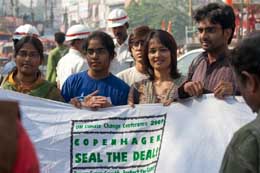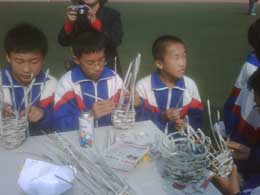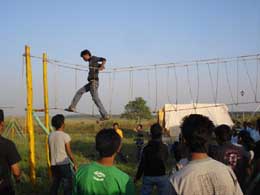Seal the Deal
As the SAYEN (South Asia Youth Environment Network) Secretariat, CEE is conducting the 'Seal the Deal' Campaign in 14 cities of India involving SAYEN members and supported by UNEP (United Nations Environment Programme). This is a global campaign led by the United Nations to mobilize people across the world to voice their opinions on protecting the planet and mitigating the impacts of climate change. This is being done through an online petition which is being signed globally by all the stakeholders and which will be presented at COP15 (Conference Of Parties) in Copenhagen .
 |
The campaign was launched in all the 14 cities on 24 October, the ‘ Global Day of Climate Action', and various events will continue till 30 November. |
|
|
As part of the campaign, youth volunteers are encouraging stakeholders to sign on petition sheets, on the online petition and also on ‘Seal the Deal' cloth banners.
The cloth banners and the petition sheets will be exhibited and posted on walls inside and outside the building where the COP15 meeting will take place. It is hoped that these banners and petition sheets wrapped around the whole building will exhibit a strong worldwide public demand for taking action on climate change.
Kindly Log on to http://www.sealthedeal2009.org/
STAMP YOUR VOTE AND SEAL THE DEAL!
Power Green Growth Protect People and the Planet |
|
 |
ESD Thrust in Schools in China
The fourth International Forum on ESD, held at Beijing on 22 - 24 October, gave an opportunity to international participants to understand the way ESD is being integrated in schools in China . Leading the way are 1000 project schools which act as demonstration schools and are awarded and recognised by the ESD National Working Committee in China . Kartikeya Sarabhai, Director, CEE, was invited as one of the keynote speakers in the forum.
 |
School children involved in making products out of waste materials |
|
|
The project schools develop special school-based curriculum and textbooks to integrate ESD in all their subjects. The focus is on activity-based approach and on demonstration of sustainable development (SD) principles in the school such as recycling, water conservation and energy saving.
The school programme also connects to parents and the community. Some schools also use broadcast media to reach out to a wider group of people. The emphasis is not just on bringing SD in project work, but in life as a whole.
There is also an emphasis on improving the school infrastructure. A new initiative is to reuse textbooks by collecting and passing them on to the next batch of students. For this to succeed, students are taught how to take better care of their books. Training programmes for school managers, in addition to teachers, is also seen as critical to bringing in more SD practices to schools.
|
|
 |
NGC Teachers Training Workshop at Patna
As part of a year-long strategy to work with a cluster of NGC schools in each of 3 districts of Bihar , CEE North organized the first district level training programme for 19 eco-club teachers-in-charge from 17 schools on 29 - 30 October at Patna . The objective of the workshop was capacity building of these schools in the direction of becoming model eco-club schools. The workshop was organized in association with the NGC nodal agency – the Bihar State Pollution Control Board (BSPCB), Patna – with active involvement of the District Education Officer (DEO), Patna .
As part of the annual strategy, CEE would provide year-long support to these schools, especially to the teachers-in-charge, in conducting eco-club activities.
|
|
|
Training for Promoting Herbal Gardens
CEE Andhra Pradesh conducted a training programme for 15 NGOs to promote herbal gardens and amla ( Emblica officinalis ) plantation in schools with the help of Andhra Pradesh Medicinal and Aromatic Plants Board (APMAPB). These NGOs are expected to initiate herbal gardens in about 100 schools and amla plantations in 50 schools across the state.
|
|
|
 |
CEE co-hosts International Conference on Climate Change in Athens
CEE and INARE ( Institute of Sustainable Development and Management of Natural Resources), Athens, jointly hosted the International Climate Change Conference Today's Child Tomorrow's Future: Towards 2020, in Athens during 29-31 October, 2009 . The Conference was held with a view to strengthening areas of cooperation among Greece, European Union and India, and exploring possibilities of joint project initiatives. The central theme of the Conference was climate change, youth, and the link between climate change and lifestyles/consumption patterns. There were also sessions on issues arising out of the likely impact of climate change on agriculture and food security, immigration and human security, women and health, besides education, environment and economy.
The Conference was attended by about 100 participants, including representatives from the European Union, Food and Agriculture Organisation, United Nations University, UNEP-MAP ( Mediterranean Action Plan), UNDP, the Greek Ministry of Climate Change, Energy and Environment, and representatives from universities and NGOs from Greece and India. CEE was represented by Prabhjot Sodhi and Prarthana Borah. Recommendations from the Conference were jointly drafted by the INARE and CEE team. The Conference was an outcome of an MoU between CEE and INARE to conduct joint programmes for two years. Prior to this, two workshops, one in Delhi and the other in Athens , were held.
|
|
 |
Asian Zoo Educators' Conference
The second Asian Zoo Educator's Conference (AZEC) was organized during 11-15 October at Hong Kong by Ocean Park Hong Kong and Ocean Park Conservation Foundation. About 60 participants – from China , Japan , Bangkok , Taiwan - Province of China , Korea , Bangladesh , Nepal and India – including zoo curators and zoo educators, attended the conference.
The idea behind AZEC is to provide a platform to zoo educators in Asia to meet every two years to share ideas and discuss topics of common interest. In this second AZEC, some of the issues discussed included the role of zoos with a focus on climate change, sustainable practices to promote pro-conservation attitudes, success stories and learnings.
At the Conference, Increase your Handprint and Decrease your Footprint presentation by Meena Nareshwar, CEE Zoo Education Programmes, focused on weaving sustainable actions into the programmes of a zoo, and communicating these to the visitors.
|
|
 |
Master Education Plan for Zoos of India – A pilot document
CEE was invited by the Central Zoo Authority (CZA) to collaborate in the development of the Master Education Plan for Zoos of India.
Education is as important a mandate as conservation for zoos. However, they need a framework within which to plan active educational programmes that are responsive to the needs of users.
The Master Education Plan for Zoos of India was launched by Thiru.S.Regupathy, the then Minister of State for Environment & Forests (Forest and Wildlife), Government of India and Chairman of CZA on the 27 January 2009, at CZA's 22 nd annual meeting at Delhi.
The Plan has also been uploaded on the IZE (International Zoo Educators) website - http://www.izea.net/. IZE is an association dedicated to expanding the educational impact of zoos and aquariums worldwide. Meena Nareshwar, Zoo Education Programmes, CEE, is an IZE member. |
|
 |
International Day of Climate Action
CEE Madhya Pradesh observed International Day of Climate Action with graduates of Maulana Azad National Institute of Technology, Bhopal. Pick Right: CO2 kits were distributed among the students and they organized a rally using the educational material.
 |
A student performing at Burma Bridge |
|
|
In the second half of the day, CEE in collaboration with Junoon Adventure Academy organized an adventure camp for more than 50 students. At the end, the students were briefed about the importance of the day and the science of climate change. More than 100 students participated in the different events.
|
|

